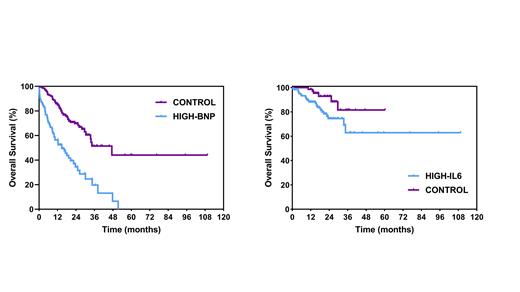Background
Diffused large B-cell lymphoma (DLBCL) is a subgroup of highly heterogenous and aggressive hematological malignancy. IPI scoring tools have been used to predict survival in DLBCL patients retrospectively. Moreover, it is indicated that cardiovascular biomarkers can predict long-term survival in myelodysplastic syndrome. To structure a more accurate prognostic model directing survival, we constructed retrospective research in our clinical institution with common cardiovascular biomarkers, for instance, IL-6, Troponin I, BNP, hydroxybutyrate dehydrogenase and creatine phosphokinase. Besides, other risk factors of cardiovascular diseases such as lipids are also taken into consideration.
Method
We retrospectively researched a total of 284 patients who were first diagnosed with DLBCL from January 2011 to November 2022, among whom 205 patients were sequenced by next-generation sequencing (NGS) before receiving therapy. Characteristics of democracy and clinical data were collected and analyzed. The primary objective is to investigate the prognostic value of common cardiovascular biomarkers in the long-term survival of DLBCL patients.
Results
A total of 284 patients were enrolled with a median follow-up time of 21.8 months. The inclusive criteria are: patients who are newly diagnosed with DLBCL and clinical data of cardiovascular mark can be retrospect, moreover, to eliminate the influence of cardiac failure we excluded those whose ejection fraction was lower than 30%.
There are 78 patients with high levels of BNP (HIGH-BNP group) and 119 patients with high levels of IL-6 (HIGH-IL6 group). In the HIGH-BNP group, overall survival is poorer than the control group (p<0.001, HR=3.07, 95%CI 1.97-4.78). Besides, in the HIGH-IL6 group, the tendency shows similitude, with a lower survival ratio (p=0.025, HR=2.65, 95%CI 1.30-5.40). Among 205 patients who received NGS sequencing, 2270 genes mutation have been detected. the most frequently detected genes are PIM1 (324, 14.3%), KMT2D (73, 3.2%), BCL6 (80, 3.5%), TP53 (63, 2.8%) and MYD88 (57, 2.5%).
Conclusion
Cardiovascular biomarkers can properly predict DLBCL patient survival.
Disclosures
No relevant conflicts of interest to declare.


This feature is available to Subscribers Only
Sign In or Create an Account Close Modal